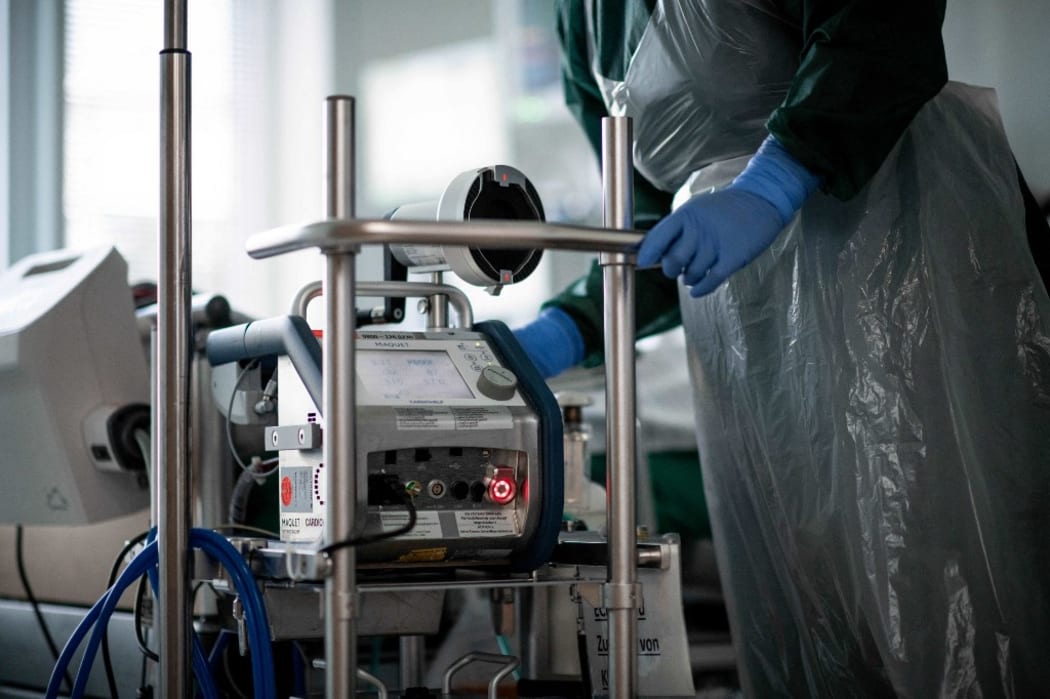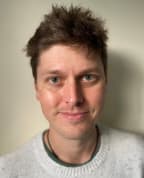Ryan Salter knows first-hand what it looks like when a health system is under extreme pressure because of Covid-19.
Dr Salter was a consulting anaesthetist at the UK's Royal Papworth Hospital in Cambridge during the first and second Covid-19 waves.
The New Zealander has now returned home and tells Kim Hill the number of ECMO (extracorporeal membrane oxygenation) referrals were so high they had to ration it.

ECMO, or extracorporeal membrane oxygenation, is being used in many countries as a last-resort to treating seriously ill Covid paitents. Photo: AFP
ECMO is a last-resort treatment that uses a bypass machine which draws blood from the patient and oxygenates it before pumping it back in.
Dr Salter says it's for people who are so severely diseased they can't get oxygen in and carbon dioxide out, even with a ventilator.

Ryan Salter. Photo: Supplied
Normally, the hospital would treat about 40 people a year on ECMO, but after a brief reopening in December last year, the number of referrals escalated to about 150 that month alone, he says.
"We had to be particularly discerning about who was accepted for this therapy. It's highly invasive and people need to fit enough to survive."
It also means there aren't enough staff to commit to the same standards of care that usually would see two expert nurses looking after one ECMO patient in Australasia.
"One of the things that became clear very early on in the British experience, is that in order to provide care for the number of people coming into the hospitals, those nursing ratios had to drop drastically," Dr Salter says.
"We would have one nurse looking after two patients with bedside carers, so non-trained staff who were working under the direction of one nurse. Then our model was to have an ECMO specialist who would oversee up to seven ECMO patients assisting the nurse and bedside carers with the management."
Part of the National Health Service's assessment on who would get the treatment is a 'risk of death' score, including considering patient age, he says.
"What became quickly apparent was that with the volume of referrals, it was going to be very difficult for us to offer this modality for anybody over about the age of 50."
The severity of the illness wasn't limited to older people, he says, as they treated a number of people under the age of 30, many of whom died, and a few pregnant women.
"We had to make plans to deliver their unborn babies whilst they're on ECMO. I understand that one of those women has subsequently died.
"We know the older you are, the more likely you are to become particularly unwell, the more likely you are to die, but it's not exclusively a disease of older people or people who have other health conditions.
"You don't know if you're going to be one of the lucky ones who doesn't get really unwell."
The survival rate for the therapy also dropped from 75 percent in the first wave to 60 percent in the second wave, he says.
"I understand that's a pattern that's been observed around the word that as we've moved through various waves of this disease, the likelihood of survival with this particularly invasive therapy has reduced."
Some of the reasons behind that, Dr Salter says, may have been that new treatments became available for less ill patients, meaning that more patients with irreversible damage were being referred to ECMO.
"I personally wonder if it's partly a toll on the staff, I wonder if staff exhaustion and burnout is playing a role, I think decision fatigue amongst senior medical staff is probably playing a role.
"These problems that creep up after a substantial period of time, dealing with the same disease over and over again, and constant struggles with staff sickness and with staff being overworked, I wonder if these things are playing a role into why those mortality rates have increased."
Some Covid-19 patients receiving ECMO therapy were also opposed to the vaccine, which was frustrating for staff to witness, he says.
"We felt frustration, we've been risking our lives.
"From an ethical standpoint, we can't not offer people care because of their personal choices and I think most New Zealand healthcare professionals would feel that quite strongly.
"But I've had informal chats with colleagues in the UK who have expressed a huge amount of frustration that they do keep offering these therapies to people who haven't received the vaccine."
People who were hesitant about the vaccine were the ones we needed to reach the most, he says.
"We know that the vaccine reduces your risk of intensive care admission.
"I think there's been some cohort studies recently which have shown that whereas under normal circumstances around 5 to 10 percent of people who get Covid will end up in ICU, that number is dropped to about 0.5 percent if you're fully vaccinated."

